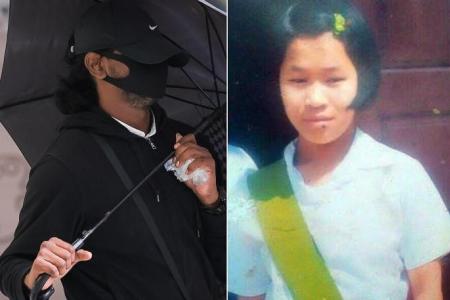Fatal Myanmar maid abuse: Victim had low BMI akin to someone with advanced cancer or extensive TB
The maid who was abused to death had a body mass index (BMI) similar to someone suffering from advanced cancer or from extensive and widespread tuberculosis.
But Dr George Paul, the doctor who performed the autopsy on Ms Piang Ngaih Don, 24, said in court on Monday that she did not show any signs of having any debilitating diseases and her body showed signs of severe malnutrition.
He described one of the photos of her body as pretty ghastly.
Police staff sergeant Kevin Chelvam, 44, who was her registered employer, is claiming trial to four charges, including one of voluntarily causing hurt and another charge of abetment of voluntarily causing grievous hurt to Ms Piang Ngaih Don by starvation.
The Myanmar national died following prolonged and heinous abuse while under his employment.
The maid weighed 39kg when she started working for Chelvam’s family in May 2015 and was a mere 24kg when she died on July 26, 2016.
Chelvam is also contesting one charge of giving false information to a police officer and another of removing from his home closed-circuit television (CCTV) cameras which recorded the abuse.
Dr Paul, who performed the autopsy on Ms Piang Ngaih Don a day after her death, said her BMI of about 11.3 - which had fallen from about 18.3 in about 10 months - indicated she was severely undernourished.
The senior consultant forensic pathologist said: “You would expect at this BMI, that the person’s life would be threatened.”
Taking the court through some photos of her body, Dr Paul described in vivid detail how several bones, including the spine and ribs were visible, and the body did not have the normal contours.
After describing one of the photos of her body as pretty ghastly, he said Ms Piang Ngaih Don’s intestines were thin and shrunken. Her liver had an abnormal appearance and was stained with bile, which could have meant there was hardly any fat entering it.
Dr Paul said the state of her physique, body and organs suggested there was a poor intake of nutrition and this could have led to the body starting to digest itself in order to survive, although this was not yet happening in Ms Piang Ngaih Don.
She had died of a brain injury with severe blunt trauma to her neck.
Dr Paul had previously noted in a report that her poor nutritional state compounded her inability to tolerate the repeated trauma.
He clarified this on Monday, saying one would usually be able to tense up the neck muscles to guard and prevent one’s self from suffering severe trauma.
Given the flaccid state of her neck, any trauma inflicted there would have direct impact on her without resistance on her part, he added.
Though he had arrived at his conclusions based on the condition of the body, Dr Paul had also seen CCTV footage of her consuming slices of bread dipped in water. It was not clear from the footage if she had consumed anything else.
Deputy Public Prosecutor Sean Teh said the footage showed her consume 63 meals in the last 35 days of her life and he noted Ms Piang Ngaih Don had consumed Nestum.
Dr Paul said the bread and Nestum would not have contributed to her diet significantly.
He added it was evident there was a mismatch between Ms Piang Ngaih Don’s protein and calories requirement and what she was consuming, and that was reflected in the state of her body.
The trial continues in the afternoon.
Chelvam’s former wife, Gaiyathiri Murugayan, 43, was sentenced in June 2021 to 30 years in prison – the longest jail term meted out in a maid abuse case in Singapore. They have two children, aged one and four at the time, and divorced in 2020.
Prema S. Naraynasamy, 64, who joined her daughter Gaiyathiri in torturing the maid, was sentenced to 14 years’ jail in January.
Prema was given three more years’ jail in June after admitting to one charge of instigating Chelvam to cause evidence of the offences in their Bishan flat to disappear, bringing her total jail term to 17 years.
Both women are expected to testify as prosecution witnesses during the trial.
Get The New Paper on your phone with the free TNP app. Download from the Apple App Store or Google Play Store now


